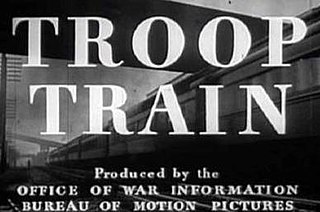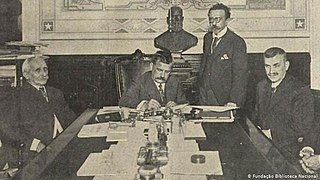External links
- The short film Brazil at War is available for free viewing and download at the Internet Archive .
| Brazil at War | |
|---|---|
| Produced by | Office of War Information, Office of the Coordinator of Inter-American Affairs |
Release date |
|
Running time | 9 min |
| Country | United States |
| Language | English |
Brazil at War is a 1943 propaganda short documentary film produced by the Office of War Information and the Office of the Coordinator of Inter-American Affairs.
The 9-minute-long film starts by showing Brazil's comparisons with the United States, such as its geographic size, population, and military history during World War I. It trumpets Brazil's supposed "progressiveness" under Getúlio Vargas, noting that Rio de Janeiro is a "modern city" known for its arts and culture, and that Brazil's constitution allows freedom for its workers and social services. Then shots of the Brazilian Army and Navy are shown, and we are told that 3 million conscripts are planned. (A Brazilian Expeditionary Force did later see action in the Italian Campaign.)
After the segment on Brazil's military, the economic contributions of Brazil are delved into, especially its rubber and crystal production.

The Brazilian Armed Forces are the unified military forces of the Federative Republic of Brazil. Consisting of three service branches, it comprises the Brazilian Army, the Brazilian Navy and the Brazilian Air Force.

Latin America is a collective region of the Americas where Romance languages—languages derived from Latin—are predominantly spoken. The term was coined in France in the mid-19th century to refer to regions in the Americas that were ruled by the Spanish, Portuguese, and French empires.

The Good Neighbor policy was the foreign policy of the administration of United States President Franklin Roosevelt towards Latin America. Although the policy was implemented by the Roosevelt administration, President Woodrow Wilson had previously used the term, but subsequently went on to justify U.S. involvement in the Mexican Revolution and occupation of Haiti. Senator Henry Clay had coined the term Good Neighbor in the previous century. President Herbert Hoover turned against interventionism and developed policies that Roosevelt perfected.

The United States Department of War, also called the War Department, was the United States Cabinet department originally responsible for the operation and maintenance of the United States Army, also bearing responsibility for naval affairs until the establishment of the Navy Department in 1798, and for most land-based air forces until the creation of the Department of the Air Force on September 18, 1947.

The military dictatorship in Brazil, occasionally referred to as the Fifth Brazilian Republic, was established on 1 April 1964, after a coup d'état by the Brazilian Armed Forces, with support from the United States government, against president João Goulart. The Brazilian dictatorship lasted for 21 years, until 15 March 1985. The coup was planned and executed by the most senior commanders of the Brazilian Army and received the support of almost all high-ranking members of the military, along with conservative sectors in society, like the Catholic Church and anti-communist civilian movements among the Brazilian middle and upper classes. The military regime, particularly after the Institutional Act No. 5 in 1968, practiced extensive censorship and committed human rights abuses, including institutionalized torture and extrajudicial killings and forced disappearances. Despite initial pledges to the contrary, the military regime enacted a new, restrictive Constitution in 1967, and stifled freedom of speech and political opposition. The regime adopted nationalism, economic development, and anti-communism as its guidelines.

The Brazilian Army is the land arm of the Brazilian Armed Forces. The Brazilian Army has fought in several international conflicts, mostly in South America during the 19th century. In the 20th century, it fought on the Allied side in World War I and World War II. Aligned with the Western Bloc during the military dictatorship in Brazil from 1964 to 1985, it also had active participation in Latin America and Southern Portuguese Africa during the Cold War, as well as taking part in UN peacekeeping missions worldwide since the late 1950s.

The Ragamuffin War or Ragamuffin Revolution was a Republican uprising that began in southern Brazil, in the province of Rio Grande do Sul in 1835. The rebels were led by generals Bento Gonçalves da Silva and Antônio de Sousa Neto with the support of the Italian fighter Giuseppe Garibaldi. The war ended with an agreement between the two sides known as Green Poncho Treaty in 1845.
Cinema Novo, "New Cinema" in English, is a genre and movement of film noted for its emphasis on social equality and intellectualism that rose to prominence in Brazil during the 1960s and 1970s. Cinema Novo formed in response to class and racial unrest both in Brazil and the United States. Influenced by Italian neorealism and French New Wave, films produced under the ideology of Cinema Novo opposed traditional Brazilian cinema, which consisted primarily of musicals, comedies and Hollywood-style epics. Glauber Rocha is widely regarded as Cinema Novo's most influential filmmaker. Today, the movement is often divided into three sequential phases that differ in tone, style and content.

The Allies, or the Entente Powers, were an international military coalition of countries led by France, the United Kingdom, Russia, the United States, Italy, and Japan against the Central Powers of Germany, Austria-Hungary, the Ottoman Empire, and Bulgaria in World War I (1914–1918).

Brazilian cinema was introduced early in the 20th century but took some time to consolidate itself as a popular form of entertainment. The film industry of Brazil has gone through periods of ups and downs, a reflection of its dependency on state funding and incentives.

Ziraldo Alves Pinto, known mononymously as Ziraldo, is a Brazilian author, painter, comic creator, and journalist. His books have sold about ten million copies, have been translated to many foreign languages and adapted to the theater and cinema. His children's books, such as the popular O Menino Maluquinho, have also been the basis of successful films and television series in Brazil.

General Guido Hernán Vildoso Calderón is a former Bolivian military officer who served as the de facto 59th president of Bolivia in 1982. He was Bolivia's final de facto president.

Gracias Amigos was a 1944 propaganda short produced by the Office of the Coordinator of Inter-American Affairs to educate the American public about the contributions of Latin America during World War II.

Troop Train is a short American propaganda film produced by the Office of War Information in 1943.

The United States was, in 1824, the second country to recognize the independence of Brazil, after Argentina did it in 1823. Brazil was the only South American nation to send troops to fight in Europe alongside the Allies in World War II.

The Dominican Civil War, also known as the April Revolution, took place between April 24, 1965, and September 3, 1965, in Santo Domingo, Dominican Republic. It started when civilian and military supporters of the overthrown democratically elected president Juan Bosch ousted the militarily installed president Donald Reid Cabral from office. The second coup prompted General Elías Wessin y Wessin to organize elements of the military loyal to the dictator Reid ("loyalists"), initiating an armed campaign against the "constitutionalist" rebels.

During World War I (1914–1918), Brazil initially adopted a neutral position, in accordance with the Hague Convention, in an attempt to maintain markets for its export products, mainly coffee, latex and industrially manufactured items. However, following the repeated sinking of Brazilian merchant ships by German submarines, President Venceslau Brás declared war against the Central Powers in 1917. Brazil was the only country in Latin America to be directly involved in the war. The major participation was the Brazilian Navy's patrol of areas of the Atlantic Ocean.
Casablanca–Anfa Airport was an airport in Morocco (IATA: CAS, ICAO: GMMC), located about 6 kilometres (4 mi) southwest of Casablanca. Anfa Airport was one of three airports serving the Casablanca area, the others being the newer and larger Mohammed V International Airport and the Casablanca Tit Mellil Airport.
The International Military Sports Council (IMSC) or Conseil International du Sport Militaire (CISM), is an international sports association, established in 1948 and headquartered in Brussels. It is the world's second-largest multi-discipline sports organisation, after the International Olympic Committee, holding more than 20 competitions annually. Under its auspices, soldiers who may previously have met on the battlefield compete on the sports playing field. CISM organises various sporting events, including the Military World Games and World Military Championships, for the armed forces of 140 member countries. The aim of CISM is to promote sport activity and physical education between armed forces as a means to foster world peace. The motto of CISM is "Friendship through Sport" and is based on three pillars of sport, education and solidarity.

Events in the year 1943 in Brazil.